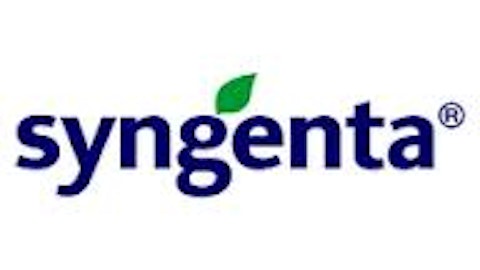No Stranger to Trouble
Monsanto is no stranger to being in court due to its practices, both as plaintiff and defendant. As defendant, Monsanto has been the target of a steady stream of lawsuits over the past three decades. For example, from 1984 to 1987, Monsanto was the defendant in the longest civil trial in U.S. history when a group of plaintiffs claimed to have been poisoned by the company’s dioxin chemicals after a train accident. Most recently, one of the company’s herbicide-resistant wheats that was not yet approved was discovered growing on a farm in Oregon, and this is currently playing itself out in the legal system.
Alternatives
If Monsanto’s troubles are more than you want to have hanging over your portfolio, some of the other agricultural-chemical companies do a better job of staying out of the spotlight.
Potash
Potash Corp./Saskatchewan (USA) (NYSE:POT), a Canadian company, is the world’s largest fertilizer company by capacity. The nature of the business (no genetic engineering, relatively environmentally-friendly practices) has kept public opinion of the company largely positive over the years.
Potash offers investors an excellent dividend yield (about 3.4%) and a reasonable P/E of 17 times TTM earnings, which are projected to grow at just over 9.1% going forward. Not quite as exciting as Monsanto’s projections, but less risky. Also, the trend toward healthier eating in North America could prove to be a positive catalyst for fertilizer manufacturers such as Potash and a negative catalyst for makers of genetically altered foods, like Monsanto’s.
Syngenta
Syngenta AG (ADR) (NYSE:SYT) is a Switzerland-based company that produces herbicides, insecticides, seed care products, and more. While the company has faced some legal action in the past over some of its products, particularly herbicides, it is nothing compared to Monsanto’s legal battles. In fact, in 2011 Syngenta was recognized by the Dow Jones Sustainability Index as one of the world’s best performing chemical companies in the world based on economic, social, and environmental performance.
Syngenta trades for about 19.5 times earnings, and pays a pretty healthy dividend yield of 2.54%. The company is projected to grow its earnings at around a 12% rate going forward, and may be the more environmentally-responsible investment in the seed and chemical space.
Summary
While Monsanto may end up providing the best long-term gains of the group, there is almost always one legal issue or another that threatens to derail the company’s growth momentum. If you would prefer not to take such a risk, or just prefer to invest more environmentally responsible, either of the other two companies listed would make a great alternative.
The article Lots of Potential, Both Positive And Negative originally appeared on Fool.com and is written by Matthew Frankel.
Matthew Frankel has no position in any stocks mentioned. The Motley Fool has no position in any of the stocks mentioned. Matthew is a member of The Motley Fool Blog Network — entries represent the personal opinion of the blogger and are not formally edited.
Copyright © 1995 – 2013 The Motley Fool, LLC. All rights reserved. The Motley Fool has a disclosure policy.



